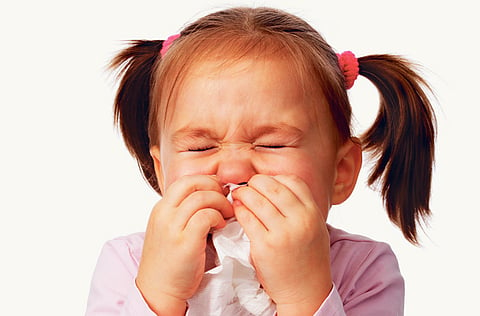Make an allergy action plan
Children suffering from food allergies can be perfectly safe with proper vigilance and education

For kids with severe food allergies, navigating the back-to-school blitz of new teachers, new friends, classroom parties and after-school athletics can be quite a challenge, but with the right game plan, parents can ensure their children's safety without cutting into their fun.
"We have always remained vigilant, but others often do not understand the seriousness of certain allergies," says Katie Corl, author of The Pesky Peanut: A True Story. The inspiration for her children's story came after her son Kelly was diagnosed with a severe peanut allergy at 11 months old.
"Many adults do not realise that Kelly could stop breathing if he eats a peanut, peanut dust, peanut oil or a product that has been cross-contaminated with a peanut product," Corl says.
Education is the answer
Living a full life despite a severe food allergy starts with education. "We have always been very clear with our son on the seriousness of his condition because you cannot completely avoid peanuts, but you do not want children to be too afraid to enjoy life," Corl says. "Kelly attends birthday parties, school activities and all sorts of events. He is just very aware and careful. He understands that there will be times he cannot have the treats his friends may be eating, and he is OK with it."
It's never too soon to teach kids about their allergies, but it's up to parents to educate other adults, as well. From teachers and school staff to babysitters, coaches, neighbours and other parents on play dates, it's imperative that those close to the child know how to prevent and swiftly respond to an allergic reaction.
"Food allergy safety should never be left to just one person," says Maria L. Acebal, CEO of The Food Allergy & Anaphylaxis Network, a US-based food awareness body. "Truly anyone who has supervisory authority over that child should be educated about his or her food allergies — and it is vital that these adults know what to do in an emergency."
Kids should know what they can and cannot eat — and they should know the early warning signs of an allergic reaction so they can inform the nearest adult. "Children with food allergies should be empowered to speak up and let an adult know when they are not feeling well and to keep insisting something is wrong. A child should never be embarrassed to admit that he isn't feeling well, even if he ate something he shouldn't have. The child's safety is the first priority," Acebal says. Supervising adults such as teachers should be provided with a list of foods to avoid, a description of possible symptoms and training on howto use an epinephrine auto-injector, such as the EpiPen, which the child should carry at all times.
"First and foremost, always have the child's epinephrine auto-injector readily available," Acebal says, adding, "It must travel everywhere the child travels — and be sure to teach others how to use it."
If possible, leave an epinephrine auto-injector in the classroom. "Response time is vital," Corl explains. "It is essential that the EpiPen is near the child. In the case of a reaction, you have seconds to respond, and you do not want to be running to the school office looking for it."
Spread the word
Parents also can create a food allergy action plan, a downloadable resource from Faan (The Food Allergy & Anaphylaxis Network, http://www.FoodAllergy.org), and distribute copies to the school nurse, teachers, coaches, babysitters and friends' parents. The form provides room to record the child's allergies, medications and emergency contact information. It also offers an overview of possible symptoms and quick instructions on how to use an EpiPen.
Safety is the first priority, so parents should not hesitate to speak up regarding their child's condition. "When you have a child with a severe allergy, you live in that world every day. But others do not, so it is our job to share the information with others," Corl says. "Most children and adults are very curious, and we have always experienced nothing but compassion."
— creators.com
GET PROACTIVE
Preparations of note
To further prepare you for the school year, Maria L. Acebal, Chief Executive Officer of The Food Allergy & Anaphylaxis Network, suggests the following:
* Equip kids with a medical identification bracelet — one they'll actually want to wear. Allerbling offers funky, kid-friendly plastic bracelets with snap-on food allergy charms ($5-$18 — about Dh18-Dh66). They are available in 16 styles to cover a wide range of food allergies.
* Get the school involved. Suggest an annual staff-wide training on food allergies. The Safe@School programme from Faan, available online, provides educators with facts and practical techniques to manage food allergies at school.
* Make it fun for kids. Let youngsters learn about their allergies with games and lessons taught by Alexander, ‘the elephant who couldn't eat peanuts,' on the website FaanKids. A team of animated zoo characters explores a range of food allergies through puzzles, games and stories.
— creators.com
Sign up for the Daily Briefing
Get the latest news and updates straight to your inbox
![Sharjah to pilot UNESCO’s ECCE-PATT tool, highlighting its leadership in early learning systems. [Illustrative image]](http://media.assettype.com/gulfnews%2F2026-02-08%2F3mxn16n8%2Fchild.jpg?w=320&auto=format%2Ccompress&fit=max)
